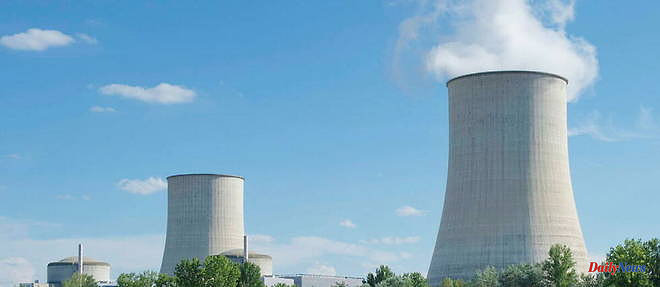The text was adopted by 402 votes for, 130 against. In the National Assembly, the presidential majority was able to count on the support of LR, RN and communists to vote on Tuesday March 21 at first reading of the nuclear revival bill, amputated from the controversial safety reform. This vote offers a brief breather to the government, shaken by the protest against the pension reform. By opposing nuclear power, the leader of the environmental group Cyrielle Chatelain did not fail to attack a "defeated", "prevented" executive, at the "bench of the living dead".
After the vote, the Minister for Energy Transition Agnès Pannier-Runacher on the contrary praised the "co-construction" carried out on this text dedicated to the atom, sending "a clear signal to our" nuclear "sector which has suffered from conflicting injunctions in the past". Supported by a very large majority in the Senate at the end of January, it must continue its parliamentary course with a compromise between deputies and senators in a joint committee or during a second reading.
Technical, this bill reduces the procedures and the deadlines to concretize the promises of Emmanuel Macron to build six new EPR reactors by 2035, and to launch studies for eight others. It is limited to new installations located on or near existing nuclear sites. To "achieve carbon neutrality", we must "no longer have nuclear shame": this is the slogan of Macronist deputies like the rapporteur Maud Bregeon, former EDF, who scrapped against EELV and the Insoumis, favorable to the exit of the atom and the transition to 100% renewables from 2045.
"What are the risks worth", the "tons of waste?" “, retorted LFI Anne Stambach-Terrenoir, before insisting on the “significant” crack recently revealed in the piping of a reactor at the Penly power station (Seine-Maritime). The socialist group also voted against, even if it "is not part of the anti-nuclear political formations", according to Marie-Noëlle Battistel. In the midst of the energy crisis, a majority of the hemicycle supports nuclear, "decarbonized" and a guarantee of "sovereignty".
The National Rally voted for the text, "although insufficient", attacking "limited ecologists". The boss of the deputies Les Républicains Olivier Marleix praised a "hoped-for political turnaround" by the right. But "many questions" remain "unresolved", he warns, on the use of electricity, technologies and "actors in the new nuclear".
In the wake of the Senate, the Assembly dropped the objective of reducing the share of nuclear energy in the French electricity mix to 50% by 2035, a "lock" introduced under the presidency of François Hollande . Agnès Pannier-Runacher wants "neither ceiling nor floor" on the subject, while nuclear energy represents about 70% of electricity production usually, but only 63% in 2022 due to the shutdowns of several reactors for corrosion. The deputies also validated a toughening of the penalties in the event of intrusions into the power stations, under the protests of the left, which fears a brake on militant anti-nuclear actions.
Ecologist Cyrielle Chatelain challenged nuclear "sovereignty" which "does not solve the problem of dependence on authoritarian countries", with Russian "enriched uranium" "delivered" on Monday "to Dunkirk". During the debates, the government was defeated on its security reform project, which was the subject of strong criticism even in its camp. The executive would like to found the Institute for Radiation Protection and Nuclear Safety (IRSN), a technical expert, within the Nuclear Safety Authority (ASN), the policeman of the power stations. But MPs voted to preserve the current "dual organisation".
The government does not intend to disarm and could put the subject back on the table during the continuation of the parliamentary shuttle. "It's a match in several sets and we won the first round", warns François Jeffroy, representative of the IRSN inter-union, who has already organized several days of strike and remains "mobilized". This text follows a law to accelerate renewable energies, adopted in February, and precedes a multiannual energy programming law, expected at best this summer. The oppositions criticize a "sausage-making".












